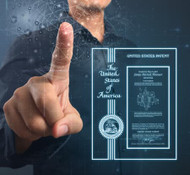The Future of New Patents in the U.S. Over the Next 10 Years: The AI Influence
Nov 3rd 2025
The future of new patents in the U.S. over the next 10 years is a complex issue with several influencing factors, most notably the rise of Artificial Intelligence (AI). Here's a breakdown of what the future might hold for new patent issuances:
Potential Increase in Patent Activity:
- AI as a Tool for Innovation: AI is increasingly being recognized as a powerful tool that can accelerate the innovation process. It can assist in idea generation, data analysis, identifying patterns, and even designing new products and processes. This could lead to a surge in novel inventions across various fields.
- New Fields of Innovation Driven by AI: AI itself and its applications are creating entirely new areas of innovation. This includes machine learning algorithms, AI-powered software, and AI integrated into various industries like healthcare, transportation, and manufacturing. Each of these areas has the potential to generate numerous patentable inventions.
- A More Favorable Patent Eligibility Environment (New Policy): Recent guidance from the U.S. Patent Office (USPTO), signaled by Director John Squires, makes it easier for AI and software-related inventions to be deemed patent-eligible under the rule for what can be patented. By instructing examiners to focus on technical improvements to computer functionality and cautioning against "categorically excluding AI," the new policy significantly reduces a major historical barrier to patenting AI, which is expected to encourage a surge in new patent applications in this sector. Read more here: https://www.iam-media.com/article/uspto-director-signals-shift-in-approach-subject-matter-eligibility-ai-applications
- Increased Focus on Specific Technologies: Current trends indicate a growing number of patent applications in areas like AI, biotechnology (especially gene editing and mRNA technology), virtual and augmented reality, and sustainable technologies. This focus suggests continued innovation and patenting in these sectors.
- Globalization and International Cooperation: As businesses operate globally, there's a growing emphasis on international patent protection. Efforts to harmonize patent laws and streamline international filing processes could encourage more patent applications worldwide, including in the U.S.
Potential Decrease or Shift in Patent Types Due to AI:
- AI as an "Inventor" Debate: A significant ongoing discussion revolves around whether AI can be listed as an inventor on a patent. Current U.S. patent law requires an inventor to be a natural person. If this stance remains, inventions entirely generated by AI might not be patentable under current frameworks, potentially leading to fewer patents in certain AI-dominated invention areas.
- Focus on Different Forms of IP Protection: Instead of patents, some innovations arising from or involving AI might be protected through other means, such as trade secrets or copyrights, especially for software-related inventions. Companies might choose to keep their AI algorithms and related innovations as trade secrets rather than disclosing them in a patent.
- Increased Efficiency in R&D: AI could make the research and development process more efficient, potentially leading to fewer, but more significant, inventions. Instead of many incremental improvements, AI might help identify and develop breakthrough innovations more rapidly.
- Ethical Considerations: The patenting of certain AI-related technologies, such as facial recognition, autonomous weapons, and surveillance systems, raises ethical concerns. This could lead to policy changes or stricter scrutiny of such patent applications, potentially limiting their numbers.
Overall Outlook: A Summary of the AI Patent Landscape
The total number of patent applications is expected to remain high and will likely increase significantly, driven by the accelerating pace of technological development fueled by AI.
Here is a summary of how recent U.S. Patent and Trademark Office (USPTO) policy changes will affect the patent world:
Commemorate AI Achievements with a Patent Plaque
The future of U.S. patenting is bright, especially in the field of Artificial Intelligence. As your company or team secures these complex and valuable patents—which represent a crucial technological leadership in the AI age—it is vital to recognize the achievement.
Commemorate this success by ordering a custom U.S. Patent Plaque or Award. A high-quality plaque or personalized award serves as a lasting symbol of ingenuity, recognizing the hard work of inventors and the technical significance of the issued patent. Honor your team's contribution to the future of AI innovation today.




